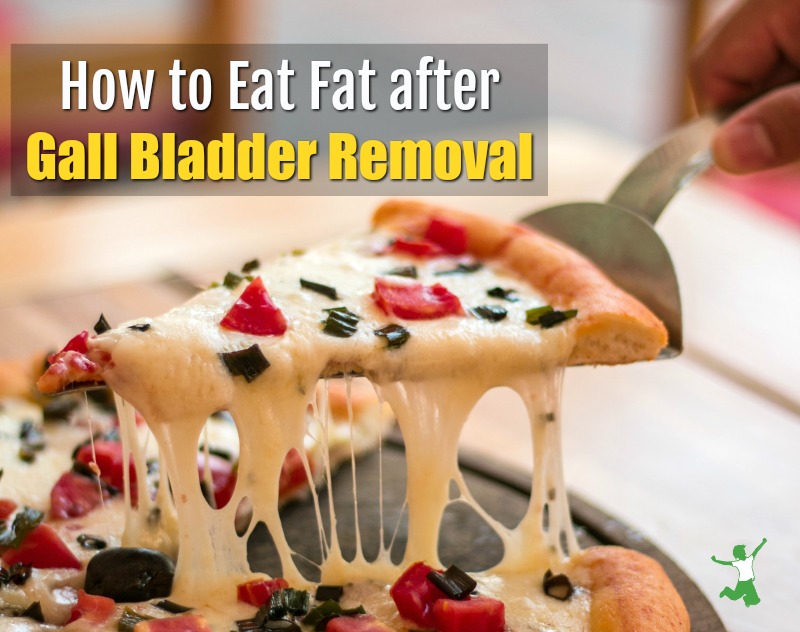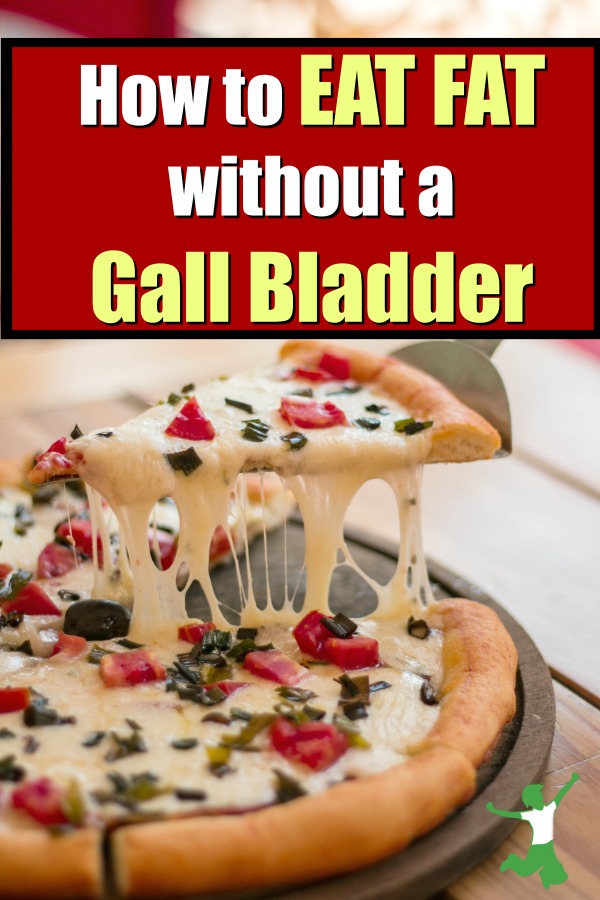How to eat fat comfortably without digestive distress after gall bladder removal. This ensures adequate fat-soluble vitamins in the diet for optimal health and vitality.
How to eat fat comfortably after gallbladder surgery seems to be an increasingly common dilemma nowadays. You have to wonder if these people tried a simple, doctor-developed gall bladder cleanse before deciding to go under the knife.
Sadly, their practitioners probably never suggested this first.
Why in the world are so many people having problems with this small organ that aids in fat digestion by storing and concentrating bile produced by the liver?
Could the gallbladder laparoscopic surgery epidemic that is occurring even in young girls be related to our fat-phobic society? (1, 2)
Constantly eating rancid fats or avoiding healthy ones like butter has the potential to trigger a malfunctioning or atrophying organ from lack of proper use.
Whatever the reason, there are indeed a lot of folks walking around without a gallbladder. Many are under the incorrect impression that after removal they can no longer eat fats without digestive discomfort.
YES! You Can Eat Fat without a Gallbladder
The first thing to realize after gallbladder surgery is that you can most certainly still eat fat.
The bile necessary to digest most fat is made in the liver, not the gallbladder, and you still have a liver, right?
What you really need is a dietary strategy that compensates for the fact that your body no longer has a place to store and concentrate the bile.
The approach is similar to a person who has had her appendix removed. These people must replenish beneficial flora after intestinal illness because there is no longer a place where good bacteria remain secure during bouts of gastroenteritis.
Please note that the tips outlined below are also very helpful to those who have been eating lowfat for a long time and are just now coming around to the fact that whole, traditional fats in the diet are critical to health.
Many times, folks who start to embrace and eat a plentiful amount of fats again after many years of avoidance experience the same digestive challenges as someone after gallbladder surgery. It’s almost like their bodies have “forgotten” how to digest fats!
So whether you are adjusting to life after gallbladder surgery or simply trying to adjust to eating fats again, keep these tips in mind for making the transition that much easier.
Cholesterol Needed After Gallbladder Surgery
It is very important thing to realize after gallbladder surgery that you still need cholesterol to produce bile which assists with the digestion of regular long-chain fats and oils. Note that short or medium-chain triglycerides like coconut or palm oil do not require bile for digestion.
One of the benefits of cholesterol is the easy production of bile. The very foods that have sufficient and healthy quantities of cholesterol are those that are, you guessed it, quite fatty, like liver, egg yolks, cream, and butter. (3)
Avoiding fat after gallbladder surgery is potentially going to compound problems with digesting fat in the long run as you won’t be getting the healthy, unprocessed cholesterol you need to produce bile!
Do you see the vicious cycle that can occur if you avoid fat after gallbladder surgery?
Please note that this discussion does not include oxidized cholesterol like what is in pasteurized, homogenized dairy (UHT organic milk and skim milk included) and the vast majority of processed foods.
Oxidized cholesterol is to be avoided in the diet and is the type of cholesterol that can trigger heart disease. (4)
Bitters Stimulate Bile Production
Once you are comfortable with the fact that you can and should eat fat after gallbladder surgery and that it is wise to do so in order to provide your liver with the raw materials necessary for bile production, the next step is to “train” your liver to produce the bile. This way, you will have the digestive juices you need at the proper time to digest the fats you eat with your meals.
Eating at regular intervals that your body can adjust to can go a long way toward this goal.
If a regular routine for consuming your fats does not prove helpful after a period of time or you are temporarily off schedule for whatever reason, use of traditional bitters or quality digestive enzymes can be used in conjunction.
Herbal bitters are plant-based extracts that are rich in minerals (vetted and recommended source).
Bitters work better than digestive enzymes in my experience. They are an ancient tonic for stimulating the liver to produce bile.
Traditional Asian cultures have long valued bitters for their digestive benefit. They also use them for their cleansing properties which promote increased strength and healing.
A single teaspoon of bitters in a small amount of water in the morning and in the evening should be sufficient to stimulate your liver to produce adequate amounts of bile. A spoonful of cold-pressed, organic sunflower lecithin after a fatty meal can also be helpful.
Still Can’t Eat Fat Comfortably After Gallbladder Removal?
If despite all your best efforts, you still have digestive issues with fats after gallbladder surgery, you can use a bile salts supplement to assist you.
Supplements should be a last resort, however. It is always best to encourage the body to do its job unassisted if at all possible.
The important thing to keep in mind is that the need for healthy, unprocessed fats does not change after gallbladder surgery. You still need these fats for optimal health. Therefore, finding a way to consume them comfortably is of paramount importance.
Keep in mind the research of Dr. Weston A. Price. The most revered foods in ancestral cultures were all fatty and of animal origin. These foods contained large amounts of Vitamins A, D, and K2 which were responsible for their strong, sturdy babies and children, resistance to chronic and infectious disease, easy fertility, and vitality into advanced age.
These fat-soluble activators supercharge mineral absorption into the tissues. Thus, eating lowfat is a recipe for disaster! It will likely contribute to a mineral starved state and other deficiencies and health challenges over time.
Fat is a critical nutrient that you cannot do without and still enjoy vibrant health.
Finding a successful strategy for consuming foods with the fats you need is the best approach after gallbladder surgery…not avoiding them as recommended by conventional medicine.
References
(1) More Young Women Suffering from Gall Bladder Disease
(2) Your Gall Bladder Needs Fat!
(3) Digestion and Absorption of Food Fats
(4) Atherosclerosis. 2000 Mar;149(1):181-90









BAD Fats are what ruin a healthy Gall Bladder to begin with. One of my nieces had hers removed – the other has opted to renew hers with intelligent well informed diet. Coming along fine.
my gall bladder was surgically removed in 2007 … my digestion seems really good. we did the gaps diet most of 2011 which helped. I drink kefir/booch. also supporting my adrenals & taking desiccated thyroid has been great. maybe thats why it seems fine. how do you know if you are not digesting fats? and is there a test for liver function?
How would one have trouble digesting fats? I had mine removed 6 years ago and never noticed a difference….
Michael the “advice” came from my inner stubborn self, and intuition. It just happens it was the right thing for me.
Thanks for this. I will share it with a family member that needs it. 🙂
I had a gall bladder attack in 2009. it was determined that (at the time) it was functioning at 12% and my DR recommended surgery. I declined. I figured, 12% is better than 0% and it must be there for a reason. Since then I have been following largely a weston a price type x gaps diet, lots of healthy fats and have never felt better in regards to diet. Western Dr’s basically have 2 tools in the their toolboxes, drugs and surgery. Unless my life in in danger, I say no to either.
what i wish people would be notified of is how common gall bladder issues can be from pregnancy. When my son was 6 weeks old i suffered for a whole week thinking I had a bad case of food poisoning, and on my very first mother’s day i went to the ER and they said that i was not going home because I was “a very sick girl”. Turns out I had pancreatitis & gall stones and had to have my gall bladder out as soon as the pancreas was less inflamed. # other moms in my moms group (all our kids were born same month) had to have theirs out at varying times. no pregnancy book i ever read talked about this fact. luckally, I have not had digestive issues.
I know this is a long shot but I am replying to an older post hoping that someone named Maria that posted on August 23rd might see this. She spoke about success with a naturopathic doctor from natureworksbest.com . I am hoping that she may respond as I have some questions for her. We hope to find a way to not have my wife’s gall bladder removed. I am thankful that there is good info in this post if she does have the procedure, but my desire still is that we can avoid it somehow.
@Joydeb Chandra Debnath, you should be supplementing with a product that supports the liver and has ox bile in it when you eat fats. I’m amazed that most doctors do not recommend this. Or eat more medium chain fatty acids like coconut oil. They do not require bile to be broken down and absorbed. Apex Energetics makes a product called Bilemin. Designs for Health has one called LVGB.